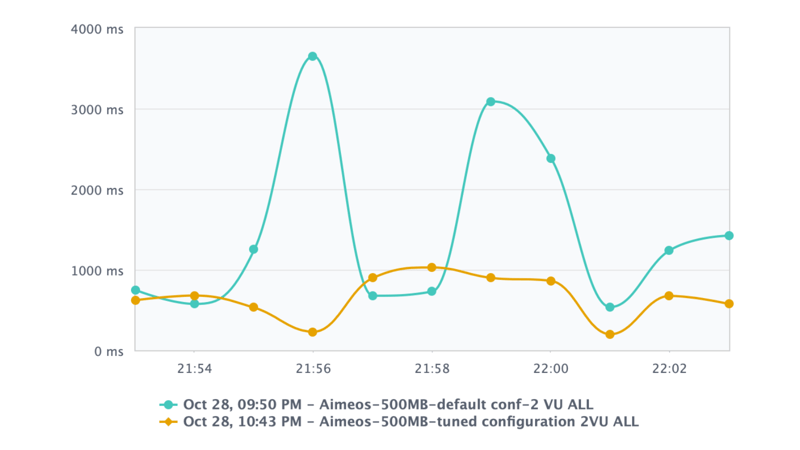Navigating the intricacies of database performance can be challenging, but understanding key metrics like latency is crucial. As businesses increasingly rely on data-driven insights, ensuring that databases respond swiftly and efficiently becomes paramount. In this article, we'll delve into the concept of MySQL latency, its significance, and how Releem, a pioneer in database optimization, approaches this metric.
What is Latency?
Latency is a term that is commonly used across various fields, from networking to audio processing. However, when we talk about databases, especially relational databases like MySQL, the concept of latency takes on a specific meaning.
In this context, latency refers to the duration or time interval between the moment a data request is initiated and the moment the response to that request is completed.
To understand latency better, let's break down the process into three steps:
- Initiation – This is when a user, application, or system sends a query or request to the database. It could be as simple as retrieving a single data point or as complex as pulling a large dataset based on multiple conditions.
- Processing – Once the database receives the request, it begins processing. This involves searching for the relevant data, possibly joining multiple tables, applying filters, and preparing the data for retrieval.
- Completion – This is the final step, where the database sends back the requested data to the user or application. The response could be the required data, a confirmation of a data modification, or even an error message if something went wrong.
Why is Latency an Optimization Objective for Releem?
For many, latency is just a technical metric, but for Releem, it's an integral part of our dedication to our clients. We want to help your business deliver great user experiences while ensuring that your MySQL databases run at peak efficiency.
User Experience – The Direct Link Between Latency and Satisfaction
Immediate Gratification
We live in an era of instant gratification. Users expect immediate responses, whether they're browsing a website, using an app, or accessing a platform. A delay of even a few seconds can make the difference between a satisfied user and a frustrated one.Consistency Across Interactions
It's not just about speed – it's about consistency. Users expect the same swift response every time they interact with an application. By optimizing latency, Releem ensures that your users receive a consistently responsive experience, building trust and loyalty.Competitive Edge
In a market flooded with applications and platforms, the user experience can be a major differentiator. By configuring MySQL databases to have low latency, Releem positions its clients ahead of competitors.
Efficiency – Doing More with Less
Resource Utilization
A system with optimized latency uses its resources more efficiently. This means that for the same computational power, storage, and memory, the system can handle more requests. It's akin to a well-oiled machine that operates at peak performance.Cost Implications
Efficiency isn't just about performance – it has direct cost implications. By handling more requests with the same resources, your organization can reduce operational costs. Over time, these savings can be significant, allowing the company to invest in other critical areas.Preventing Overloads
High latency can be a sign of system overload. By optimizing for low latency, Releem ensures that your systems are never overwhelmed, preventing potential crashes or slowdowns.
Scalability – Preparing for the Future
Handling Growth
As your application expands, both the number of users and the amount of data it processes will increase. By prioritizing latency optimization, Releem ensures that your company's infrastructure can accommodate this growth while maintaining optimal performance.Guarding Reputations
Any lag or performance issue can tarnish your brand's reputation. Releem's commitment to minimizing latency acts as a shield, ensuring that clients' databases run efficiently and fostering trust and positive feedback from their end-users.
How Does Releem Calculate MySQL Latency?
Not all latency metrics are created equal. Some offer a glimpse into average performance, while others reveal how a system behaves under strain. At Releem, we place significant emphasis on the p95 latency metric.
The 95th percentile (p95) latency is a metric that indicates the maximum latency experienced by 95% of the queries. It's a valuable metric because it provides insight into the typical worst-case scenario, excluding the top 5% of outliers.
Releem calculates the p95 latency using the following SQL query:
select `s2`.`avg_us` AS `avg_us`
from (
(select count(0) AS `cnt`,round(`performance_schema`.`events_statements_summary_by_digest`.`AVG_TIMER_WAIT` / 1000000,0) AS `avg_us`
from `performance_schema`.`events_statements_summary_by_digest`
group by round(`performance_schema`.`events_statements_summary_by_digest`.`AVG_TIMER_WAIT` / 1000000,0)) `s1`
join
(select count(0) AS `cnt`,round(`performance_schema`.`events_statements_summary_by_digest`.`AVG_TIMER_WAIT` / 1000000,0) AS `avg_us`
from `performance_schema`.`events_statements_summary_by_digest`
group by round(`performance_schema`.`events_statements_summary_by_digest`.`AVG_TIMER_WAIT` / 1000000,0)) `s2`
on(`s1`.`avg_us` <= `s2`.`avg_us`)
)
group by `s2`.`avg_us`
having ifnull(sum(`s1`.`cnt`) / nullif((select count(0) from `performance_schema`.`events_statements_summary_by_digest`),0),0) > 0.95
order by ifnull(sum(`s1`.`cnt`) / nullif((select count(0) from `performance_schema`.`events_statements_summary_by_digest`),0),0)
limit 1
This query essentially calculates the average time in microseconds (avg_us) for queries, grouping them by their rounded average timer wait. It then determines the latency at which 95% of the queries fall under, giving the p95 latency.
Ready to Optimize Your MySQL Database?
Understanding and optimizing MySQL latency is just one facet of what Releem offers. Our commitment to enhancing MySQL databases goes beyond metrics – it's about delivering tangible results that drive business success. If you're ready to elevate your database performance and offer your users an unparalleled experience, Releem is here to assist.
Visit Releem today to learn more about the 44 metrics we use for optimization or to get started with a Free account.





















